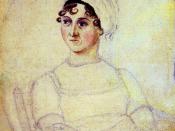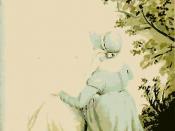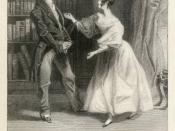In Jane Austen's "Pride and Prejudice," one of the most prevalent themes throughout the novel is the nineteenth-century English society's preoccupation in procuring socially advantageous marriages. It was the era where much importance was placed on marriage and all things in connection with it.
One of the primary purposes of getting married at that time is economical stability. Mrs. Bennett's immortal line, "...that a single man in possession of a good fortune, must be in want of a wife." clearly depicts this. Women feel that since all men of good fortune are in want of wives, they, the women, must also be in want of husbands of great fortune. Thus, mothers like Mrs. Bennett would often try their best to get their daughters married to wealthy men like Mr. Bingley. Likewise, even men sometimes get married for mercenary intentions. For example, Mr. Wickham married Lydia only because she came with a settlement of five thousand pounds and another hundred pounds per annum.
The other prominent purpose of marriage in Pride and Prejudice seems to be to elevate or at least preserve one's social status and to secure profitable connections. This is illustrated in Lady Catherine de Bourgh's case. She hoped to maintain her social status by soliciting a marriage between her daughter and her esteemed nephew, Mr. Darcy; a very wealthy master of great estate, honoured and respected by all. Similarly, Charlotte Lucas married Mr. Collins' because he was in possession of a parsonage and had distinguished connections with Lady Catherine de Bourgh, his patron.
People also got married for the sake of 'doing the right thing.' This is evident in Mr. Collins' marriage proposal to Elizabeth Bennett and later to Charlotte Lucas, where he made it clear that marriage was something that his patron advised...



Good
Very good level of language, good analysis of topic. Could have looked at a few more factors though.
1 out of 1 people found this comment useful.